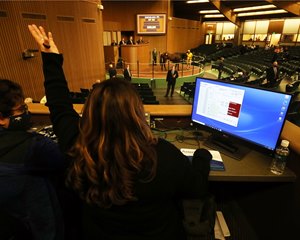Keeneland September Enters New Realm With Book 2


The Keeneland September Yearling Sale entered a new realm and price point during the Sept. 16 session that began Book 2 after a one-day break that followed the two-day Book 1 in which 14 horses were sold for seven figures.
No individual broke through the $1 million mark Wednesday as the day's topper was a son of Uncle Mo purchased by Mayberry Farm for $950,000. Consigned by Gainesway, agent, the colt (Hip 506) is from the same female family as grade 1 winner and sire Twirling Candy .
Keeneland reported 185 yearlings grossed $40,861,000 for an average price of $220,870 and a $180,000 median. The session RNA rate was 38.9% as 118 head went unsold.
Cumulatively, from 834 horses cataloged through the first three sessions, Keeneland has sold 411 horses for $129,081,000, an average price of $314,066 and a $250,000 median. The cumulative RNA rate is 36.7% as 238 head have not met their reserves.
According to BloodHorse MarketWatch data, the weakest part of the market was the $50,000-$99,999 price range, with only 32 of the 76 offered at that level sold. Conversely, all 21 offered at the $400,000-plus range were sold.
While direct comparisons are not viable for the 2019 auction when Book 1 consisted of three sessions, at this juncture a year ago 340 horses had grossed $160,463,000, with an average price of $471,950 and a $355,000 median. The RNA rate was 26%.
Geoffrey Russell, the director of sales operations, said it was not surprising there were no seven-figure horses Wednesday and that the top lots were on a par with a pre-pandemic market a year ago.
"Book 1 is where our million-dollar horses should be, if we do our job right," he said. "Last year at this session, we had 16 horses bring over a half-million dollars, and this year we had 12. Given this is the year of COVID, I think that's a pretty strong statistic.
"Last year was a surreal market. It was one of the strongest September markets in a long time. The whole feel of the market was very strong. To replicate that, even in a normal year, would have been difficult. What we're doing at the moment—in an unusually not-normal year—I think we should be very appreciative of our sellers who are here and our buyers who are here to make this market."
Russell said the high RNA rate reflected the reality that breeders are trying to recoup their investments and are willing to not sell when they do not meet expectations.
"When you breed at one end of the market and have to sell at another, it's very difficult to come to terms with that, and we're seeing some of that," he said. "It's coming to the adjustment of 'what I have in the horse and what I'm getting for the horse.' We hope that adjusts as we go forward."
Not surprisingly, buyers are vying for the same horses, particularly those deemed to have the best chance of future success.
"They seem to alight on the same horses, driving those prices up," Russell said.
Shannon Arvin, Keeneland's president-elect and interim head of sales, said there was strong international participation, especially with online bidding.
"In a time when there was such uncertainty about how much international participation there would be, we were very happy," she said. "It's a very diverse buyer base. We continue to have a lot of activity on the internet, with 150 bids and six sold on the internet."

While the market reflected recent trends in which there was stiff competition for the better lots, there was also a vibrant middle market.
"It's a tough market in which to buy good horses," said Ben Glass, who represents Gary and Mary West. "You lead a good one in there, you had better be tied on because there's a lot of money here. I've been blown out of the water. I don't know if it's a more select market, or just more people on the same horses I'm on."
During the session, Glass signed for three yearlings for $375,000, noting that the Wests were sticking to their game plan.
"I haven't been able to get after it yet," Glass said. "Whatever we get, we get. We don't get excited and start chasing horses. We pick the ones we really like and go after them. We've never given the big money for horses. If we get the right one, we get it. We raise a lot of horses, too."
